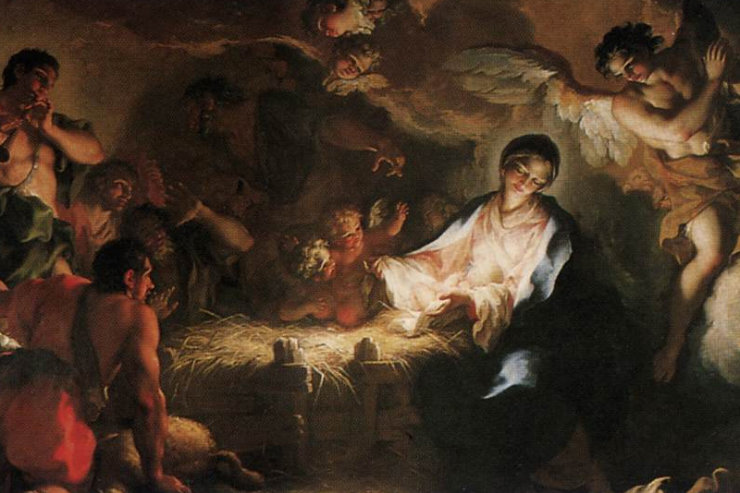St. John and the Incarnation
by Joannie Watson | December 27, 2019 12:04 am

“God became man and became friends with people like us.”
It’s fitting that a few days after we celebrate God becoming man, we celebrate the feast of one of his best friends. John the apostle, evangelist, guardian of the Blessed Mother, and beloved disciple was also an apologist for the mystery we celebrate during this season: the Incarnation.
One of the most beautiful Scripture passages on the Incarnation is John’s reminder to his readers that opens his first epistle:
“What was from the beginning,
what we have heard,
what we have seen with our eyes,
what we looked upon
and touched with our hands
concerns the Word of life—for the life was made visible;
we have seen it and testify to it and proclaim to you the eternal life that was with the Father and was made visible to us- what we have seen and heard we proclaim now to you, so that you too may have fellowship with us; for our fellowship is with the Father and with his Son, Jesus Christ. We are writing this so that our joy may be complete.” (1 Jn 1:1-4)
He knows that the mystery of the Incarnation is bewildering. What religion would claim that their God became one of them? How can Christianity honestly profess belief that their God not only became one of them, but that He died? …and that he died for his creation? The absurdity seems to get greater the more you plumb the depths of the mystery.
And yet that’s exactly what John is driving home. He is fully aware that the mystery is difficult to believe. He knows, as do the other Apostles, that the Incarnation and Crucifixion is a stumbling block and a folly. False teachers are already coming onto the scene, trying to paint a different picture. Perhaps Christ only appeared to be human (Docetism). Or perhaps he wasn’t really fully divine, but sort of an elevated creature (Arianism).
So he drives home the point here. I saw Him with my own eyes. I touched his flesh. I walked with Him. This passage is powerful because it reminds us of the humanity, the realness, and the tangibility of Jesus. John is known for his lofty, theological writings, but here, I am reminded that the deep theological thoughts are companions with the dusty roads of Galilee. John walked those roads with Jesus. He witnessed cures and miracles, and he ate dinner with him. He probably hugged him and laughed with him, too.
John isn’t writing this epistle as a journalist, but as a friend. And he’s writing it so that we too may enter into that friendship, even 2,000 years later. Christ came that we might have access to the Holy Trinity, and how does he do that? By giving us access to his humanity.
God became man and became friends with people like us. He was born of a woman like me. He grew up in a home, played with his neighbors, and worked with his dad. God did all of these things. For me.
The only way we could have access to the communio of the Trinity is through humanity. And so Christ comes and walks and drinks and laughs and cries with us—ultimately, to suffer with us. For us. Because of us.
That is the mystery we celebrate this Christmas season: that God was born in a stable, on a certain night in history, at a certain location on the globe – not because it makes a nice story, but so that we as unworthy humans might have a part in Trinitarian communion.
The danger of this plan, however, is great. What if that baby is ignored? If that carpenter is dismissed? What if that tiny host that appears to be bread is forgotten, overlooked, or worse—abused?
John knows the danger. That is why he so passionately reminds us: I have touched him. The mystery was made visible to me. And now I write to you, that you too may believe. That is the task in front of us this Christmas. Do I really believe? Pray for the gift of faith, that we too who get to see and touch him every day—albeit hidden under the veil of the Eucharist—may never dismiss, ignore, or abuse Him.
“Jesus Christ has come in the flesh… In this way the love of God was revealed to us: God sent his only Son into the world so that we might have life through him. In this is love: not that we have loved God, but that he loved us and sent his Son as expiation for our sins.” (1 Jn 4:2, 9-10).
We need you prayers and financial support. Both one-time and monthly donations are welcome. Just $10 a month will help cover the cost of operating Integrated Catholic Life for one day! Please help us bring enriching and inspiring Catholic content to readers around the world by giving today. Thank you!
Please share this post on Facebook and other social media below.
- via Wikimedia Commons: https://commons.wikimedia.org/wiki/File:Adoration_of_the_Shepherds_1707.jpg
Source URL: https://integratedcatholiclife.org/2019/12/watson-st-john-and-the-incarnation/